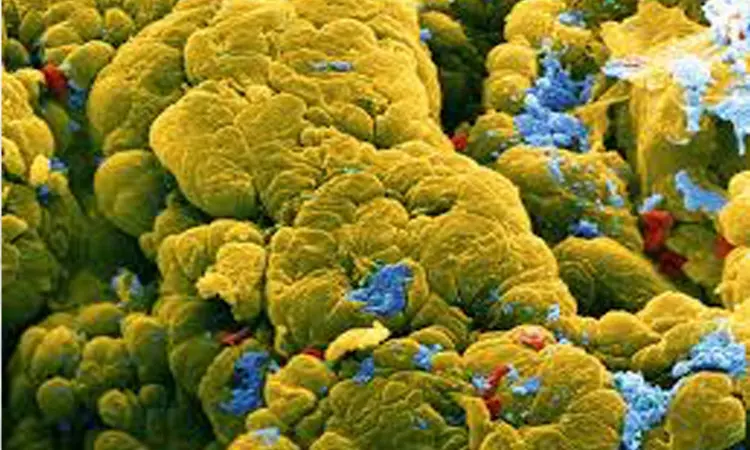- Home
- Medical news & Guidelines
- Anesthesiology
- Cardiology and CTVS
- Critical Care
- Dentistry
- Dermatology
- Diabetes and Endocrinology
- ENT
- Gastroenterology
- Medicine
- Nephrology
- Neurology
- Obstretics-Gynaecology
- Oncology
- Ophthalmology
- Orthopaedics
- Pediatrics-Neonatology
- Psychiatry
- Pulmonology
- Radiology
- Surgery
- Urology
- Laboratory Medicine
- Diet
- Nursing
- Paramedical
- Physiotherapy
- Health news
- Fact Check
- Bone Health Fact Check
- Brain Health Fact Check
- Cancer Related Fact Check
- Child Care Fact Check
- Dental and oral health fact check
- Diabetes and metabolic health fact check
- Diet and Nutrition Fact Check
- Eye and ENT Care Fact Check
- Fitness fact check
- Gut health fact check
- Heart health fact check
- Kidney health fact check
- Medical education fact check
- Men's health fact check
- Respiratory fact check
- Skin and hair care fact check
- Vaccine and Immunization fact check
- Women's health fact check
- AYUSH
- State News
- Andaman and Nicobar Islands
- Andhra Pradesh
- Arunachal Pradesh
- Assam
- Bihar
- Chandigarh
- Chattisgarh
- Dadra and Nagar Haveli
- Daman and Diu
- Delhi
- Goa
- Gujarat
- Haryana
- Himachal Pradesh
- Jammu & Kashmir
- Jharkhand
- Karnataka
- Kerala
- Ladakh
- Lakshadweep
- Madhya Pradesh
- Maharashtra
- Manipur
- Meghalaya
- Mizoram
- Nagaland
- Odisha
- Puducherry
- Punjab
- Rajasthan
- Sikkim
- Tamil Nadu
- Telangana
- Tripura
- Uttar Pradesh
- Uttrakhand
- West Bengal
- Medical Education
- Industry
Multiple sclerosis may not increase risk for breast, colorectal cancers: Study

MINNEAPOLIS - People with multiple sclerosis (MS) may not be at higher risk of developing two of the three cancers that occur most commonly in people with MS, breast and colorectal cancer, than people who don't have the disease, according to a new study published in the November 25, 2020, online issue of Neurology®, the medical journal of the American Academy of Neurology. However, the study did find that people with MS had a higher incidence of bladder cancer.
"This is good news for people with MS, because earlier studies have shown a link between MS and breast and colorectal cancers," said study author Ruth Ann Marrie, M.D., Ph.D., of the University of Manitoba in Winnipeg, Canada, and a member of the American Academy of Neurology. "While we did not find that link, our study did show that people with MS had a 72% greater risk of developing bladder cancer."
The study looked at health records of 53,984 people with MS and 266,920 people without MS in Canada. Each person with MS was matched with five people without the disease. Researchers then used cancer registries to estimate incidence of breast, colorectal, bladder and 12 other cancers among the people in the study.
After adjusting for factors like sex, education and socioeconomic status, researchers found that cancer incidence and mortality rates did not differ between the people with MS and without MS for breast and colorectal cancer.
Bladder cancer was a different story. When researchers looked at the years 2008-2017, the incidence of bladder cancer was 25 cases per 100,000 person-years in the group with MS, and15 cases in the group without MS. Person-years take into account both the number of people in the study and the amount of time each person spends in the study. After adjusting for factors like age, sex and socioeconomic status, people with MS had a 72% greater chance of developing bladder cancer than those without the disease.
"The increased risk of bladder cancer in people with MS may have to do with the fact that people with the disease are more likely to have urinary tract infections and use catheters," Marrie said. "However, more research is needed to confirm our findings."
A limitation of the study is that although the results were adjusted for people having multiple medical conditions at the same time, researchers were unable to account for differences in health behaviors such as smoking, diet and physical activity. Also, the study did not account for the possibility of specific MS-modifying therapies contributing to peoples' cancer risk.
Hina Zahid Joined Medical Dialogue in 2017 with a passion to work as a Reporter. She coordinates with various national and international journals and association and covers all the stories related to Medical guidelines, Medical Journals, rare medical surgeries as well as all the updates in the medical field. Email: editorial@medicaldialogues.in. Contact no. 011-43720751
Dr Kamal Kant Kohli-MBBS, DTCD- a chest specialist with more than 30 years of practice and a flair for writing clinical articles, Dr Kamal Kant Kohli joined Medical Dialogues as a Chief Editor of Medical News. Besides writing articles, as an editor, he proofreads and verifies all the medical content published on Medical Dialogues including those coming from journals, studies,medical conferences,guidelines etc. Email: drkohli@medicaldialogues.in. Contact no. 011-43720751


